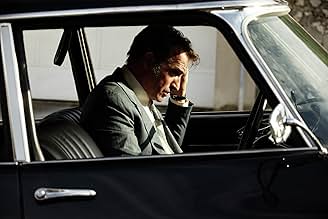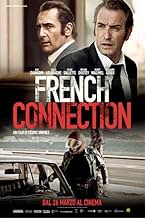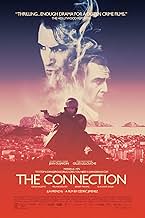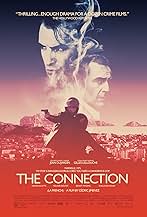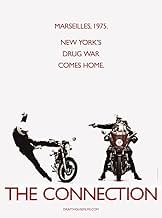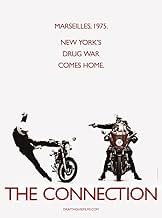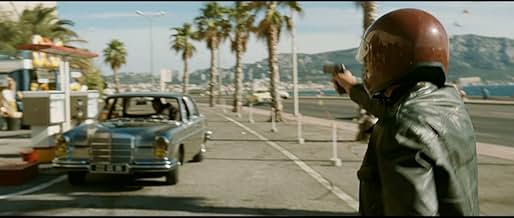AVALIAÇÃO DA IMDb
7,1/10
13 mil
SUA AVALIAÇÃO
Um magistrado da polícia francesa passa anos tentando derrubar uma das mais poderosas redes de tráfico de drogas do país.Um magistrado da polícia francesa passa anos tentando derrubar uma das mais poderosas redes de tráfico de drogas do país.Um magistrado da polícia francesa passa anos tentando derrubar uma das mais poderosas redes de tráfico de drogas do país.
- Direção
- Roteiristas
- Artistas
- Prêmios
- 2 vitórias e 5 indicações no total
- Direção
- Roteiristas
- Elenco e equipe completos
- Produção, bilheteria e muito mais no IMDbPro
Avaliações em destaque
If I could only recommend you go and see one film this year, The Connection would be it.
The film follows the true story of the rise and fall of Pierre Michel "The Judge", played by The Artist's Oscar winning Jean Dujardin, against the Marseillaise mafia gang The French Connection in the 1970s. The story had already been put to cinema in The Judge (1984), but this time the story's been redone much more ambitiously.
It's a typical good guy versus bad guy story, but it's the bells and whistles in this film that really make it so much more than that. The director achieves the perfect combination of action, drama, comedy and tragedy with the irrepressible Mediterranean sun beating down on every day time scene in the film. The Mediterranean settings give the film a sense of glamour and surrealism, juxtaposing the surreal nature of life as a successful drug trafficker in the 1970s, passing time between seaside villas and the biggest nightclub in Marseille.
This is film making at its best - it's as if the screen writer and director Cédric Jimenez pulled out an old school book of film making craft written in the 1970s and followed all the old rules to perfection to bring about not only a brilliant piece of cinematic entertainment, but also of art. This film is a living, breathing and intimate nostalgic reinvention of the 1970s and a just and accurate portrayal of a real gangster story, with some liberties in representing the character's private lives.
Cédric Jimenez grew up himself in Marseille in the 1970s and says that the story of the Judge has run through his veins his whole life. He has wanted to make this film as long as he has wanted to be a film maker, starting his career initially as a documentary maker. He chose to shoot the whole film with a hand held camera, which gives the film it's intimate and raw feeling.
It is an absolute viewing pleasure to be immersed back into the 1970s era and the sets and costumes have been rendered to perfection, to every last detail. The velour furniture, the dingy nightclubs, the glamorous dresses and old style police surveillance technologies are a delight to rediscover. The cowboy style of policing in the 1970s makes the action scenes much more exciting than anything depicting the risk-averse 2000s - the only person in the film wearing even a bullet proof vest is the gang leader Gaëtan "Tany" Zamper (Gilles Lellouche).
There are countless unforgettable scenes in this film, the dialogue is witty, the action is edgy and the acting is superb. Another highlight is the film's soundtrack featuring endless classics from the 1970s (Blondie, Kim Wilde and the Velvet Underground) and tunes by composer Guillaume Roussel that reflect the film soundtracks of the time (for example, his tune Meurtre de fou). It can be tough to watch a sub-titled film for 2h15min, but believe me it's worth it.
The film follows the true story of the rise and fall of Pierre Michel "The Judge", played by The Artist's Oscar winning Jean Dujardin, against the Marseillaise mafia gang The French Connection in the 1970s. The story had already been put to cinema in The Judge (1984), but this time the story's been redone much more ambitiously.
It's a typical good guy versus bad guy story, but it's the bells and whistles in this film that really make it so much more than that. The director achieves the perfect combination of action, drama, comedy and tragedy with the irrepressible Mediterranean sun beating down on every day time scene in the film. The Mediterranean settings give the film a sense of glamour and surrealism, juxtaposing the surreal nature of life as a successful drug trafficker in the 1970s, passing time between seaside villas and the biggest nightclub in Marseille.
This is film making at its best - it's as if the screen writer and director Cédric Jimenez pulled out an old school book of film making craft written in the 1970s and followed all the old rules to perfection to bring about not only a brilliant piece of cinematic entertainment, but also of art. This film is a living, breathing and intimate nostalgic reinvention of the 1970s and a just and accurate portrayal of a real gangster story, with some liberties in representing the character's private lives.
Cédric Jimenez grew up himself in Marseille in the 1970s and says that the story of the Judge has run through his veins his whole life. He has wanted to make this film as long as he has wanted to be a film maker, starting his career initially as a documentary maker. He chose to shoot the whole film with a hand held camera, which gives the film it's intimate and raw feeling.
It is an absolute viewing pleasure to be immersed back into the 1970s era and the sets and costumes have been rendered to perfection, to every last detail. The velour furniture, the dingy nightclubs, the glamorous dresses and old style police surveillance technologies are a delight to rediscover. The cowboy style of policing in the 1970s makes the action scenes much more exciting than anything depicting the risk-averse 2000s - the only person in the film wearing even a bullet proof vest is the gang leader Gaëtan "Tany" Zamper (Gilles Lellouche).
There are countless unforgettable scenes in this film, the dialogue is witty, the action is edgy and the acting is superb. Another highlight is the film's soundtrack featuring endless classics from the 1970s (Blondie, Kim Wilde and the Velvet Underground) and tunes by composer Guillaume Roussel that reflect the film soundtracks of the time (for example, his tune Meurtre de fou). It can be tough to watch a sub-titled film for 2h15min, but believe me it's worth it.
This is the other half of the story of seventies classic - 'The French Connection. Jean Dujardin ('The Artist') plays Magistrate Pierre Michel who in 1974 gets promoted to deal with organised crime in Marseilles. Gilles Lellouche ('Mea Culpa' and 'Mesrine') plays the drugs uber lord 'Tany' – who rules with an iron fist and any other implement that can come to hand. He runs a crime network that includes night clubs, casinos and restaurants and will do anything to keep what he has and make tons more cash
This is one of those times when crims made so much money that they could buy their way out of trouble – even before they were in it. So inevitably Michel has more than the crooks to do battle with. It follows the story from the mid seventies and into the eighties and it is one helluva ride.
The period detail is excellent, the cars, fashions and the music are all spot one – even the decor. There is violence and plenty of potty mouth goings on, but it is all in context. It is also a stylish film that means that most shots are great to look at as well as being intensely entertaining. This is a film that should get a lot more attention and if you are a stranger to French cinema it may be a good one to start with to see just how well they can make them.
This is one of those times when crims made so much money that they could buy their way out of trouble – even before they were in it. So inevitably Michel has more than the crooks to do battle with. It follows the story from the mid seventies and into the eighties and it is one helluva ride.
The period detail is excellent, the cars, fashions and the music are all spot one – even the decor. There is violence and plenty of potty mouth goings on, but it is all in context. It is also a stylish film that means that most shots are great to look at as well as being intensely entertaining. This is a film that should get a lot more attention and if you are a stranger to French cinema it may be a good one to start with to see just how well they can make them.
In the many reviews and description of the movie, it is mentioned that Pierre Michel is a detective. That is wrong. Pierre Michel was a judge, which is very different from a detective. Was Pierre Michel doing a detective work? Well it could be considered as yes, but his main work position was being a judge.
Pierre (Jean Dujardin) is a good French cop we can admire; Tany (Gilles Lellouche) is a drug lord we can like despite his murderous heroin. The Connection, loosely based on incidents surrounding the infamous French Connection, both real and depicted in William Friedkin's 1971 award-winning thriller starring Gene Hackman. If you can separate yourself from the testosterone-fueled business, you will experience a thriller of humane proportions.
Pierre has taken over the magistrate's responsibility for mob activity, and heroin is the big enemy. Writer-director Cedric Jimenez and writer Audrey Diwan expertly navigate between his daily professional activity and after-work family life with a wife and two children. When it's revealed that Pierre had an addictive gambling problem, the audience is appreciative of his weakness but cognizant of his obsessive personality, such as pursuing Tany.
The film also shows mobster Tany in his two worlds of business and family. While the director may too frequently parallel edit the two characters in these roles, he successfully reveals two characters with traits we can understand.
Beyond the inevitable blood, of which there is less than might be expected, is the oft-told tale of highly-driven men who want successful careers and happy family life—those of us who have seen many such thrillers know the balance is impossible. In a way the film draws us into each sphere with responses more sympathetic than judgmental.
The pace of The Connection is frenetic between paralleling the two principles' activities and chronicling the confrontations (I like when the two meet at a remote spot in a low-key, un-macho response for both) many of which are hair-raising heists and busts. Just as often, however, the film slows it down to a daily level that draws in our attention to the little things of life yet keeps the suspense and terror in the background.
As in A Most Violent Year, starring Oscar Isaac about a good but going-bad business man in NYC in the early '80's, so too does The Connection make that lawless time, albeit European, seductive because Dujardin is so compelling while he breaks laws to stop crime. It's ironic and complicated. That's life, and that's Chinatown, Jake.
Pierre has taken over the magistrate's responsibility for mob activity, and heroin is the big enemy. Writer-director Cedric Jimenez and writer Audrey Diwan expertly navigate between his daily professional activity and after-work family life with a wife and two children. When it's revealed that Pierre had an addictive gambling problem, the audience is appreciative of his weakness but cognizant of his obsessive personality, such as pursuing Tany.
The film also shows mobster Tany in his two worlds of business and family. While the director may too frequently parallel edit the two characters in these roles, he successfully reveals two characters with traits we can understand.
Beyond the inevitable blood, of which there is less than might be expected, is the oft-told tale of highly-driven men who want successful careers and happy family life—those of us who have seen many such thrillers know the balance is impossible. In a way the film draws us into each sphere with responses more sympathetic than judgmental.
The pace of The Connection is frenetic between paralleling the two principles' activities and chronicling the confrontations (I like when the two meet at a remote spot in a low-key, un-macho response for both) many of which are hair-raising heists and busts. Just as often, however, the film slows it down to a daily level that draws in our attention to the little things of life yet keeps the suspense and terror in the background.
As in A Most Violent Year, starring Oscar Isaac about a good but going-bad business man in NYC in the early '80's, so too does The Connection make that lawless time, albeit European, seductive because Dujardin is so compelling while he breaks laws to stop crime. It's ironic and complicated. That's life, and that's Chinatown, Jake.
Great settings, acting, actors, soundtrack and camerawork. Complications of plot at times (who's who?) didn't hide inevitably of ending. Also unfamiliar with French justice and political systems. But well worth the watch - I couldn't leave it before the end - especially for the two lead actors. Best French movie to come along for a while. Also called The Connection. (viewed 8/16)
Você sabia?
- CuriosidadesThe Gaumont animated opening logo is the 70's one.
- Erros de gravaçãoAn early title card indicates the film taking place beginning in 1975. A shot of a truck being unloaded on a New York dock shows the World Trade Center Twin Towers under construction. The Twin Towers were opened in 1973, with construction completed prior to that.
Principais escolhas
Faça login para avaliar e ver a lista de recomendações personalizadas
- How long is The Connection?Fornecido pela Alexa
Detalhes
- Data de lançamento
- Países de origem
- Central de atendimento oficial
- Idiomas
- Também conhecido como
- The Connection
- Locações de filme
- La Ciotat, Bouches-du-Rhône, França(seaside road)
- Empresas de produção
- Consulte mais créditos da empresa na IMDbPro
Bilheteria
- Orçamento
- US$ 26.000.000 (estimativa)
- Faturamento bruto nos EUA e Canadá
- US$ 190.980
- Fim de semana de estreia nos EUA e Canadá
- US$ 10.335
- 17 de mai. de 2015
- Faturamento bruto mundial
- US$ 12.062.441
- Tempo de duração2 horas 15 minutos
- Cor
- Mixagem de som
- Proporção
- 2.35 : 1
Contribua para esta página
Sugerir uma alteração ou adicionar conteúdo ausente

Principal brecha
By what name was A Conexão Francesa (2014) officially released in India in English?
Responda






